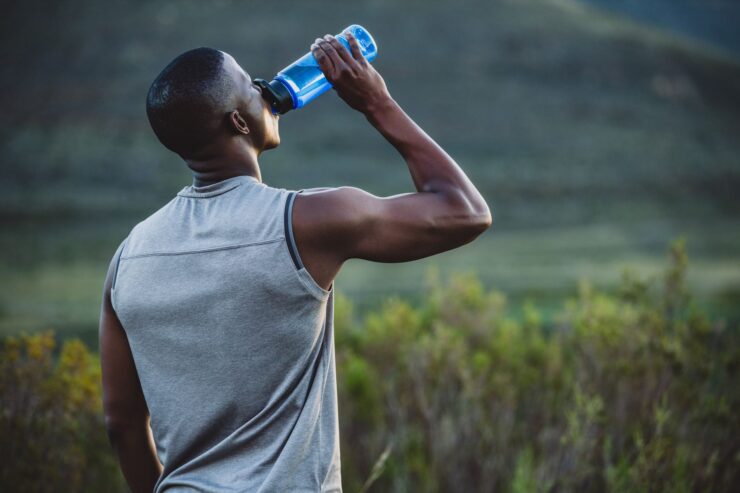Table of Contents
Energy drinks have become insanely popular in recent years, particularly among individuals trying to enhance their exercise performance. With their high caffeine and sugar content, energy drinks are marketed as quick and easy solutions for boosting energy and focus. But are they really effective for supporting exercise performance, and are they safe to consume?
This article will explore the science behind energy drinks like Life Aid and their impact on exercise performance.
Understanding Energy Drinks
Energy drinks typically contain very high levels of caffeine, sugar, taurine, and other ingredients designed to boost energy and alertness. Unlike sports drinks, primarily intended to rehydrate the body and replenish electrolytes, energy drinks are marketed as stimulants that can enhance mental and physical performance.
The specific ingredients in energy drinks can vary, but some of the most common include caffeine, taurine, B vitamins, glucose, and guarana. Caffeine is perhaps the most well-known stimulant in energy drinks, and it is a well-established performance enhancer. Taurine, on the other hand, is an amino acid that is thought to have a positive impact on heart health and athletic performance.
The Science Behind Energy Drinks

There is some true evidence to suggest that energy drinks can have a positive impact on exercise performance, particularly when it comes to endurance. The caffeine and other famous stimulants in energy drinks are thought to increase energy, reduce fatigue, and enhance focus, all of which can help athletes perform at their best.
However, it is essential to note that caffeine consumption can have negative side effects if consumed excessively or without caution. Some individuals may be more sensitive to caffeine than others, and excessive consumption can lead to jitters, anxiety, and even heart palpitations. It is recommended that individuals consult with a healthcare professional before consuming energy drinks to ensure they do not have any underlying major health conditions that could be exacerbated by caffeine consumption.
The time frame for consuming energy drinks before exercise can vary depending on the individual and their tolerance to caffeine. Some experts recommend consuming energy drinks 30-60 minutes before exercise for maximum effectiveness.
Energy Drinks vs. Other Performance Enhancers
Energy drinks are often compared to pre-workout supplements specifically designed to enhance exercise performance. Both options are thought to increase energy, endurance, and focus, but there are some critical differences between the two.
Pre-workout supplements typically contain various ingredients meant to enhance athletic performance, including creatine, beta-alanine, and arginine. While energy drinks may contain some of these same ingredients, pre-workout supplements are typically designed to be consumed before exercise, while energy drinks can be consumed anytime.
Additionally, pre-workout supplements may be more effective for individuals who are looking to build muscle mass or improve overall athletic performance, while energy drinks are better suited for individuals who are looking for a quick boost before a workout.
Benefits of Energy Drinks During Exercise

Energy drinks can benefit exercise performance when consumed in the right amounts and at the right time. Some of these benefits include:
Enhanced endurance during cardio workouts: The caffeine and other stimulants in energy drinks can help individuals push through fatigue, allowing them to exercise for longer periods.
Increased alertness and focus during strength training: Energy drinks can help individuals stay focused and alert during strength training sessions, allowing them to push themselves harder and achieve better results.
Effects of energy drinks on recovery time and muscle soreness: While less evidence supports this claim, some individuals may find that consuming energy drinks after exercise can really help reduce muscle soreness and speed up recovery time.
Risks and Side Effects of Energy Drinks
While energy drinks can positively impact exercise performance, there are also a number of risks and side effects associated with their consumption. Some of the most concerning risks include:
Health risks associated with excessive caffeine consumption: Excessive caffeine consumption can lead to a range of adverse side effects, including heart palpitations, anxiety, insomnia, and even heart attacks.
Negative effects of added sugars and artificial sweeteners: Many energy drinks contain high levels of added sugars and other artificial sweeteners, which can lead to weight gain, tooth decay, and many other health problems.
Potential for addiction or dependence: Because of their high caffeine content, energy drinks can be addictive for some individuals, leading to a dependence that can be difficult to break.
Choosing the Right Energy Drink for Your Workout

If you consider incorporating energy drinks into your fitness routine, choosing the right product for your needs is essential. Some factors to consider when selecting an energy drink include the following:
Caffeine content: Different energy drinks contain different amounts of caffeine, so choosing a product that is in line with your caffeine tolerance is important.
Sugar content: Many energy drinks contain high levels of added sugars, so it is vital to choose a product that is low in sugar or free of added sugars.
Brands and products: Not all energy drinks are created equal, so choosing a brand and product with a good reputation and trust by consumers is essential.
How to Incorporate Energy Drinks into Your Fitness Routine
If you decide to incorporate energy drinks into your fitness routine, it is important to do so safely and effectively. Some tips for using energy drinks include:
Start with small amounts: If you are new to energy drinks, start with a small amount and gradually increase your intake as needed.
Avoid consuming too close to bedtime: Because of their high caffeine content, energy drinks can interfere with sleep if consumed too close to bedtime.
Combine with healthy habits: While energy drinks can be a helpful addition to your workout routine, it is important to combine their consumption with other healthy habits, such as eating a balanced diet and getting enough sleep.
Conclusion
Energy drinks can be an effective way to boost exercise performance, but using them safely and effectively is essential. By paying attention to their ingredients, selecting the right product for your needs, and consuming them in moderation, you can enjoy the benefits of energy drinks while minimizing their potential risks and side effects. As with any dietary supplement, it is recommended to consult with a healthcare professional before adding energy drinks or any other performance enhancers to your routine.

